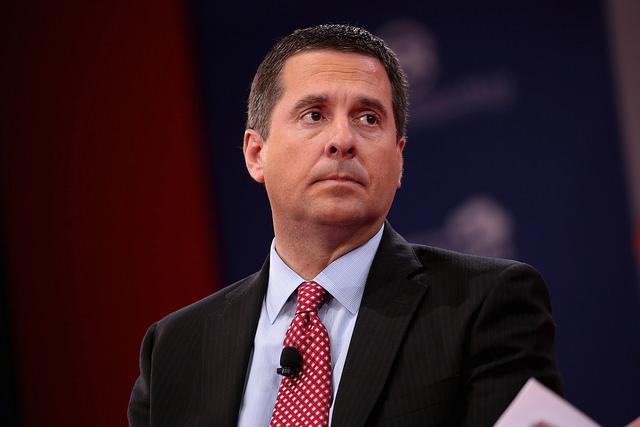The US Russia investigation memos—lessons for Australia
Posted By John Powers on March 28, 2018 @ 12:00

There are crucial lessons for Australia in the way Republican and Democrat members of the US congressional committee that oversees the intelligence agencies have played politics with the investigation into Russian interference in the 2016 presidential election.
For all the hype, the ‘memos [1]’ released by members from opposing sides on the US House of Representatives Permanent Select Committee on Intelligence [2] state nothing that was not already known; they just add to the political theatre that is Washington DC.
Neither memo provides any sort of assessment of Russian activities. Rather, they’re a blatant and disheartening illustration of the oversight process being politicised by self-interests. Each memo’s points will continue to be disputed by the other party without resolution. In the end, neither will affect the investigation in any way.
Many US intelligence experts believe the episode has eroded the trust that is required for Congress to properly oversee the intelligence community.
So, what can Australia glean from the drama surrounding these memos as our national intelligence agencies consolidate under the Director-General for National Intelligence? In Australia, such legislative oversight is the responsibility of the Parliamentary Joint Committee on Intelligence and Security [3].
This key committee cannot be allowed to become politicised as has its equivalent in the US. The members of the joint committee have, through many difficult investigations, earned a reputation as the informed and trusted representatives of the Australian-on-the-street when it comes to intelligence and security matters. The committee must maintain that standard.
Any system of parliamentary oversight is going to have its occasional strains, but this friction is likely to be compounded when the need for secrecy is at odds with core Australian values. Thus, it’s imperative that the MPs on the Joint Committee do not seek to gain political advantage by abandoning proper procedures or engaging in bipartisanship tomfoolery as has happened in the US.
To assist in both the oversight and the management of Australia’s restructured intelligence community, the joint committee should encourage Parliament to empower the director general in two specific areas that were not well-defined in the 2017 Independent Intelligence Review. The first is budget authority. As our colleagues in the US discovered when their Office of National Intelligence was formed after the 9/11 attacks, its ability to coordinate the activities of the US national intelligence community was, initially, more vision than reality.
At its inception, the Office of National Intelligence had little to no authority to get the US intelligence community to do anything that was not specifically directed in legislation or presidential order. Even then, some agencies just ignored the directives. Eventually, through Congressional legislation, plus the dogged determination and personal rectitude of the past two directors—Jim Clapper and Mike McConnell—the US Director of Intelligence was eventually given budget authority.
That, more than any other authority, is what enables the Director of Intelligence to loosely manage this federation of the willing. The Office of National Intelligence is still a work in progress, but its success so far was achieved because the Director of Intelligence could manage intelligence community resources, rather than its 17 members having a shared vision!
Giving Australia’s director-general budget authority doesn’t mean he dictates the day-to-day business of intelligence community operations. That’s the job of the agency leaders. However, the director-general, working with the joint committee, will be the focal point for the planning, programming and budgeting of Australian resources to conduct security activities—operational support, analysis, research and development, or intelligence architecture improvements.
In this way, the oversight of intelligence activities will be even more accountable to Australian taxpayers. This will also help avoid duplication of effort and ensure that funding is targeted to national intelligence objectives based on the national strategy.
A second major measure to enhance oversight and cooperation would be the establishment of a National Requirements Management Office under the director-general’s leadership. The 2017 review recommended that the Office of National Assessments be expanded to support the director-general. I believe these additional resources should be used to validate and synchronise the nation’s intelligence requirements, which in turn would be the basis for developing strategies to fill gaps in Australia’s strategic knowledge.
Such an office would foster greater collaboration and integration within the community, and provide the director-general and the joint committee a fuller appreciation of strategic requirements weighted against intelligence community capabilities. It would also link Australia’s collection agencies with the all-source assessment agencies, not just in Australia, but with our Five Eye and regional partners too.
The global community is fraying and Australia’s institutions are under a tenacious siege from within and afar. Fortunately, the establishment of the Director-General for National Intelligence’s office, overseen by the Parliamentary Joint Committee on Intelligence and Security, means there’s connective tissue between the Australian people and those charged with safeguarding their freedoms.
Article printed from The Strategist: https://aspistrategist.ru
URL to article: /us-russia-investigation-memos-lessons-australia/
URLs in this post:
[1] memos: https://www.nytimes.com/2018/02/02/us/politics/trump-fbi-memo.html
[2] Permanent Select Committee on Intelligence: https://intelligence.house.gov/
[3] Parliamentary Joint Committee on Intelligence and Security: https://www.aph.gov.au/Parliamentary_Business/Committees/Joint/Intelligence_and_Security
Click here to print.